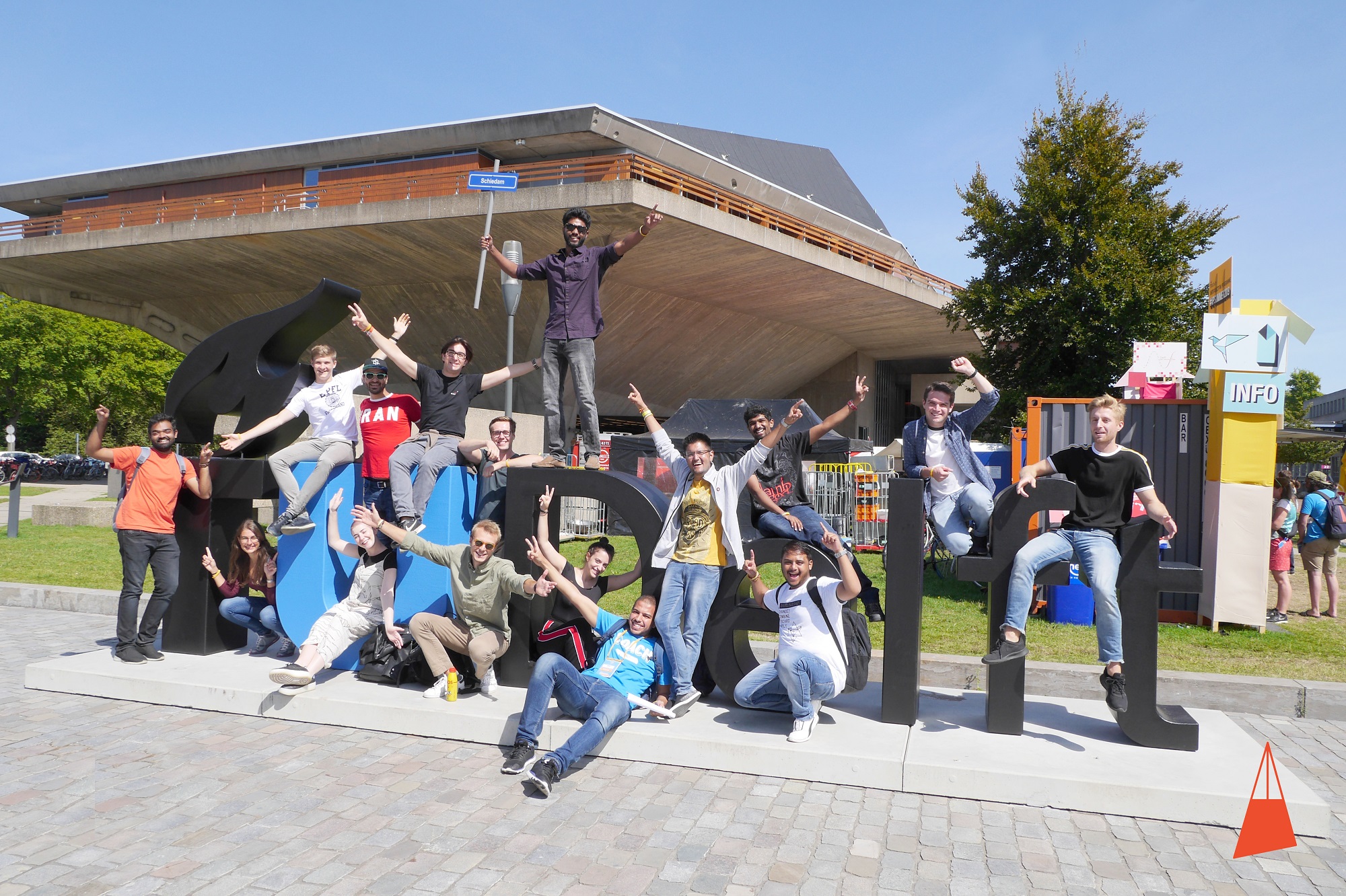Which regions or degree programmes will soon be able to continue recruiting foreign students in the face of new government restrictions? A roundtable discussion with education delegates at the House of Representatives gave a taste of the issues at stake.
A group of internationals in front of the aula building aula on TU Delft Campus. (Photo: Roos van Tongeren)
Figures provided by Statistics Netherlands (CBS) reveal that the influx of international students to the Netherlands more than doubled over the past ten years. In addition, three quarters of the country’s Master’s programmes are now entirely English-taught. A basis for almost everyone involved in Thursday’s discussion at the House of Representatives to conclude that the international influx has gone too far.
But which programmes will now have to bid their foreign students farewell? And in which regions? A few weeks ago, outgoing education minister Robbert Dijkgraaf submitted his bill on this issue to the House of Representatives. On Thursday, the House organised a discussion with fifteen experts and supporters and opponents of the plans.
English
Much of the discussion centred on the criteria for deciding whether a programme should be allowed to teach in a language other than Dutch. Existing English-taught programmes will soon have to meet those criteria if they want to continue teaching in English. Failing that, they will have a few years to switch to Dutch.
This sounds pretty stringent, but numerous exceptions have been built into the bill. Degree programmes can cite a whole range of arguments to justify an exception: labour market shortages in their field, their location in a border region or a depopulating area, their international connections or the programme’s unique international status.
The roundtable discussion highlighted the extent of these exceptions and their impact on the effect of the law. Lotte Jensen, Professor of Dutch Cultural and Literary History at Radboud University, fears that the exceptions are so broad that every English-taught Bachelor’s programme in the country could lay claim to them. She went on to ask why Master’s programmes as a whole are exempted from the law.
Economic importance
This position was countered by a range of administrators, mostly from the universities, who were keen to emphasise the economic importance of attracting international students. The head of University College Roosevelt in Zeeland was strongly in favour of an exception for the entire province, also on behalf of the region’s employers and its university of applied sciences.
Eindhoven argued for a sector-wide exemption for IT and engineering. Most parties in the House of Representatives appear to want something similar. But Astrid van Deelen of Brainport Eindhoven was keen to point out that technical expertise alone is not enough. The Eindhoven region is also in need of more GPs and teachers. She urged the House to consider the wider picture too.
Ed Brinksma, President of the Executive Board at Erasmus University Rotterdam, believes the decision on admitting more or fewer foreign students is best left to the universities themselves due to the needs of the local labour market. In the case of Rotterdam, the answer is most likely to be more. “Companies say to me, ‘Listen Ed, if you don’t provide the top international talent, we’ll just have to fly it in ourselves’.”
But the appeal to the job market is not entirely watertight, as Rosanne Hertzberger of NSC noted. “Only 17 percent of international students are still working in the Netherlands five years after graduating and that strikes me as disappointing”, she told the Rotterdam executive. There was some discussion about the exact figures, but Brinksma responded that the percentage has increased slightly in recent years.
Mountain of work
It was clear from Thursday’s discussions that exemption criteria for non-Dutch-taught degree programmes are a key issue for higher education institutions. They are concerned that any such assessment will generate a mountain of work.
Meanwhile, the education union is concerned about the future of English-speaking staff on programmes that do not pass the assessment. What will happen to them when the courses they teach switch to Dutch? The union called for the proposed transition period to be extended to at least five years.
Thursday’s discussion did not do much to clarify the positions of the political parties on this issue. As expected, parties such as VVD and NSC raised critical questions about the impact of foreign students on the housing market and English becoming too dominant in higher education. The questions put by D66 and Volt focused mainly on the benefits.
Far enough
One key question is whether the bill put forward by Dijkgraaf – a D66 minister – goes far enough for the new right-wing majority. The new education minister could decide to withdraw the bill, just as Dijkgraaf swept his predecessor’s proposals aside shortly after taking office.
Even so, the bill looks likely to pass. The House can easily make the law stricter by whittling down the number of possible exceptions. When the members submit their written questions on 27 June, we should have some indication of the direction in which things are heading.
HOP, Olmo Linthorst
Do you have a question or comment about this article?
redactie@hogeronderwijspersbureau.nl


Comments are closed.